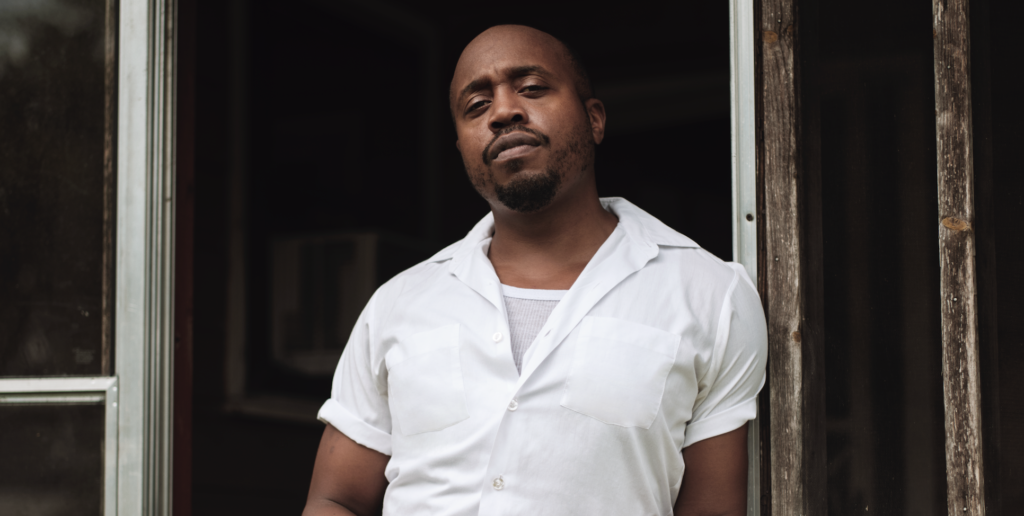When you search for Hillaryville, Louisiana, on Google, you will only find a little information. Its Wikipedia page is sparse, and there’s little online about this place. However, singer/songwriter Durand Jones, a Hillaryville native, is determined to raise awareness about his hometown. Through his debut solo album, Wait Til I Get Over, out now on Dead Oceans, Jones is using his platform to bring attention to the past, present and future of Hillaryville.
Jones, also the frontman of the retro-soul band Durand Jones & The Indications, was born in New Orleans, Louisiana. When he was very young, his father moved their family to Hillaryville, where his grandmother was already residing.
Growing up, Jones’ grandmother would always share stories about Hillaryville, a once-thriving community that diminished over the years. “We used to talk about [Hillaryville] all the time,” Jones recalls to Rated R&B. Hillaryville, a small unincorporated town located near the Mississippi River, was founded by eight freed slaves as a form of reparations after the American Civil War.
“When she was living in Hillaryville, it was much more of a self-sustaining community,” Jones notes. “There was a general store, hotels, bars, a school [and] churches. It just had this sense of community that seemed really unique. Black people could come to Hillaryville, this small country town on the river, and could feel whole. They didn’t have to feel like second-class citizens.”
Jones’ grandmother, Gerri Marie, would always say Hillaryville was “the place you’d most want to live,” as he notes on track two of Wait Til I Get Over. Jones even recalls his grandmother sharing stories from her experiences during the early stages of integration.
“She mentioned a sense of community when integration started to happen, and their kids were being bused to predominantly white schools,” says Jones. “All of the men in the community put on their Sunday’s best and rode on the buses with shotguns, making sure like, ‘Our kids are not to be messed with. It’s not gonna happen here.’ It seemed to have this close-knit sense of community back then.”
His early remembrances of Hillaryville are a bit different. “It was country rural living with a ting of hood to it,” Jones describes with a smile as he is transported to his childhood memories. “It would be quite normal to see somebody riding on a horse down the street and also see someone in a Caddy with the rims [and] the 20-inch speakers making everything rattled as they passed by.”
Jones acknowledges that as a child, he used to feel ashamed of coming from “a neighborhood that was falling apart.” He elaborates, “It felt like living in the past. When things that used to be there were no longer there, I felt embarrassed about them.”
As Jones transitioned into adulthood and left Hillaryville to pursue graduate studies in Indiana, he had an epiphany. “Through my travels and self-discovery, I realized that I should take pride in my roots and not feel ashamed of my upbringing in Hillaryville,” he reflects.
On Wait Til I Get Over, Jones strikes a proper balance of keeping Hillaryville as the album’s main focus, while highlighting his personal experiences (more on that later). “With making this record, I wanted to tackle and overcome these things that made me uncomfortable from being poor and growing up in a neighborhood that was underserved,” he declares.
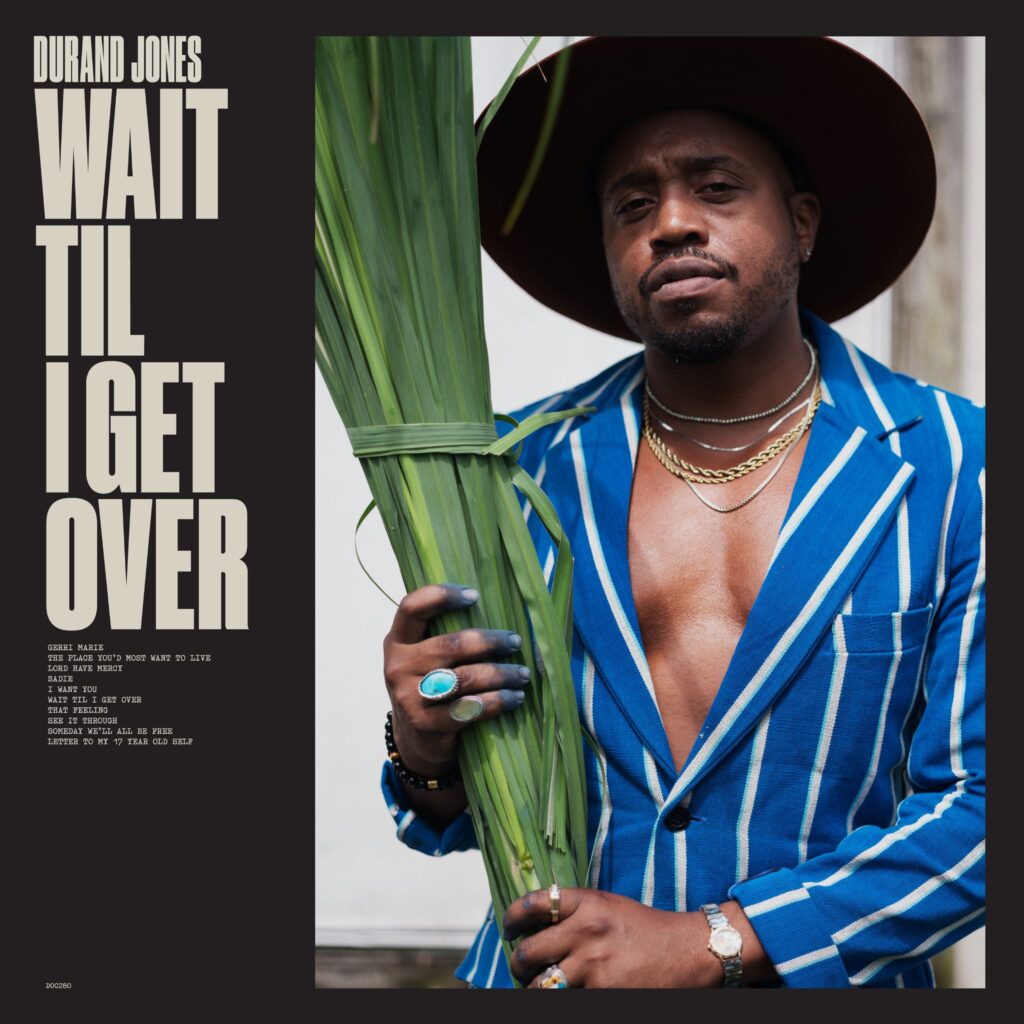
Wait Til I Get Over takes listeners on a breathtaking journey through Hillaryville, where Jones shares its history and its aspirations. Along the way, he speaks his mind and uses his personal experiences to guide songs about his sexuality (“That Feeling“), his relationship woes (“Sadie”) and his lessons learned as an adult (“Letter To My 17 Year Old Self”).
The album tastefully incorporates soul, gospel, rock, country and a pinch of hip-hop. It epitomizes a debut album — a body of work that properly introduces an artist to the public. Wait Til I Get Over is Jones’ story and no one else’s. The album is meticulously crafted to celebrate Black history, commemorating a once-thriving community in the rural South while exploring the complexities of being a queer Black person from that region. It is a beautiful work of art that celebrates both heritage and personal identity.
Jones’ vocals are a defining feature of the album, demonstrating his remarkable range and versatility. He proves himself to be a vocal paragon, seamlessly transitioning between styles and moods. Jones’ powerful, rumbling delivery can shake a room in songs like “Wait Til I Get Over,” while tracks like “Secrets” highlight his smooth and delicate delivery.
“That Feeling” is a deeply personal recount of Jones’ first queer relationship. The nuanced vignette is dotted with love, heartache and longing. “It’s the first breakup song I’ve ever written, and it’s the first and only love song I’ve written directly to another man,” Jones said in a previous statement. “I wanted this song to be a big climatic build of emotions–to capture our frustration, sadness, and nostalgia that comes with the end to any intimate relationship.”
“Lord Have Mercy,” the album’s lead single, was inspired by his 2014 visit to Hillaryville, a homecoming that would inform his debut album nearly a decade later. The song recounts Jones’ initial impressions upon returning to his hometown, where he couldn’t help but notice how much of what made it special had deteriorated.
“I started to see Hillarville settle into a new phase of life. I saw that all of the community leaders I saw as a child were gone or dying,” he shares. “Businesses that were there while I was a kid, were gone. These buildings were now crumbling or burned down. I would look down the street and see, “Oh, this person’s house is gone.” Just all of these memories of my childhood were disappearing.”
Jones wanted his vocal performance to echo his feelings of seeing his community fade away. “I’m really trying to go gritty with my voice in a way that Wilson Pickett or Otis Redding did,” he describes. “I was going for this Muscle Shoals Fame Studios quality in the sound of this record, to show how my generation sees Hillaryville. Oftentimes, a lot of my friends at home, tell me, ‘Yo, you’re the nigga that got out.’ I hate it when they say that, but at the same time, I understand Hillaryville is no longer that place you must want to live. It’s a place that people are trying to escape. I really wanted to show that within the soundscape in the music on this record.”
In Rated R&B’s interview with Durand Jones, the esteemed vocalist talks more about Hillaryville, his debut album, The Indications and more.
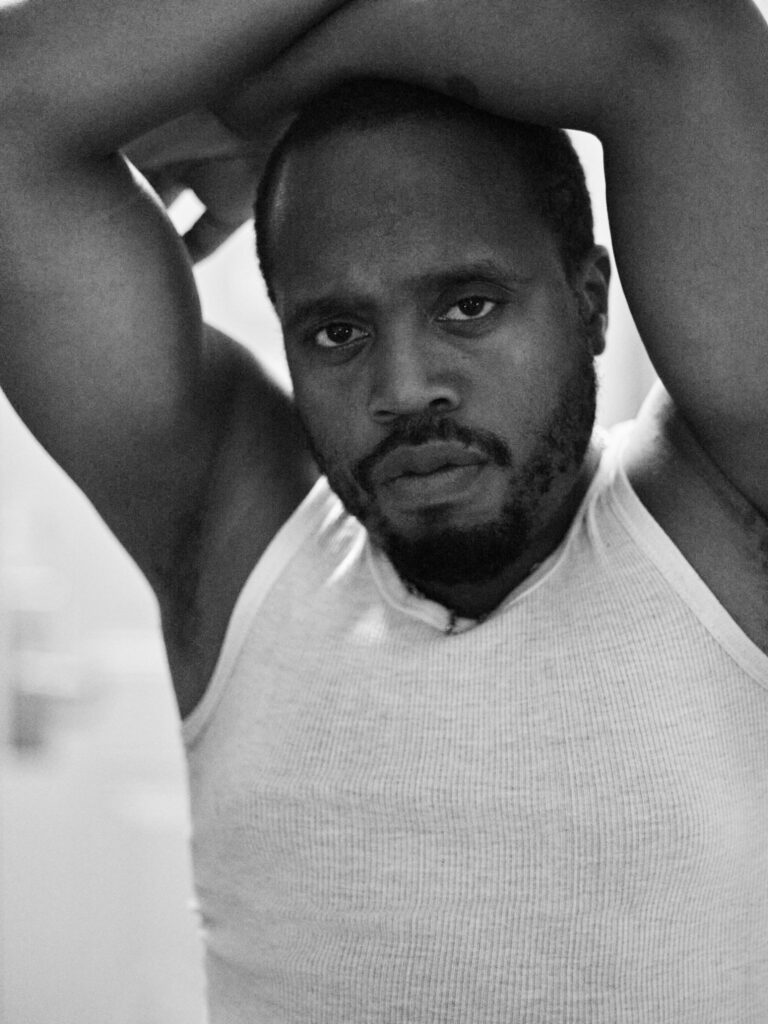
Your debut album, Wait Til I Get Over, is an ode to Hillaryville, Louisiana. Why was it important to you to tell the story of your hometown?
With making this record, I wanted to tackle and overcome these things that made me uncomfortable from being poor and growing up in a neighborhood that was underserved — a neighborhood that was crumbling. It was living in memory. What was once there was no longer. I was really embarrassed about those things. But now, going out and seeing the world and discovering a lot about myself and what I learned by being a Hillaryville and growing up there, I realized that I should be proud of that place. I should be proud of where I come from, not embarrassed about it necessarily. I really wanted to take that on with this project.
I knew that if I wanted to tell my story about being from Hillaryville, it started before I was even born, way before 1989. It goes all the way back to when this land was given to eight slaves as a form of reparations after the American Civil War. When I found out that information, I took it to be so special because I didn’t know that any enslaved folks received any form of reparations. I think Hillaryville is the case for every descendant of the enslaved to receive reparations. If you take those eight men and use them as an example, what did they do? They built a community. They built a school, churches, restaurants, bars, hotels, and anything to build a sense of community and make them feel completely whole without having to go outside and deal with the discrimination and racism of the Jim Crow South. I wanted to highlight that legacy of theirs because it felt so important and special.
What was your soundtrack growing up?
Man, my soundtrack growing up was influenced a lot by my grandmother; God rest her soul. She was heavily into gospel. She was a musician herself. She had a little organ in the house. She would play these gospel tunes that were really special. She loved Mahalia Jackson, Donny Hathaway, Whitney Houston and Dionne Warwick — she really loved Dionne. It makes me smile just thinking about that. My dad really loved Earth, Wind & Fire. He also loved Toni Braxton and Teena Marie; those were his girls. He would just blast them all the time. Those folks and their tunes were frequent throughout my grandmother’s house and my dad’s trailer — and they heavily influenced me.
You have been fishing since your childhood. What do you love about it?
Yes, I love fishing so much. It’s something I try to do every time I’m home. I started to do it as a young cat out in Hillaryville. It was so funny ’cause our parents hated for us to go behind the levee if they weren’t going. We would always try to sneak and go fishing, and we would get in trouble and get caught all the time. I didn’t realize why they thought it was so dangerous until, as an adult, I saw a huge ass alligator swimming in the river. I was like, “Okay, now I see why I shouldn’t have been swimming in that river as a kid” (laughs). But I like bank fishing on a river, catching a lot of catfish. I love the choupique; that’s a really good fish as well. I’m a seafood lover.
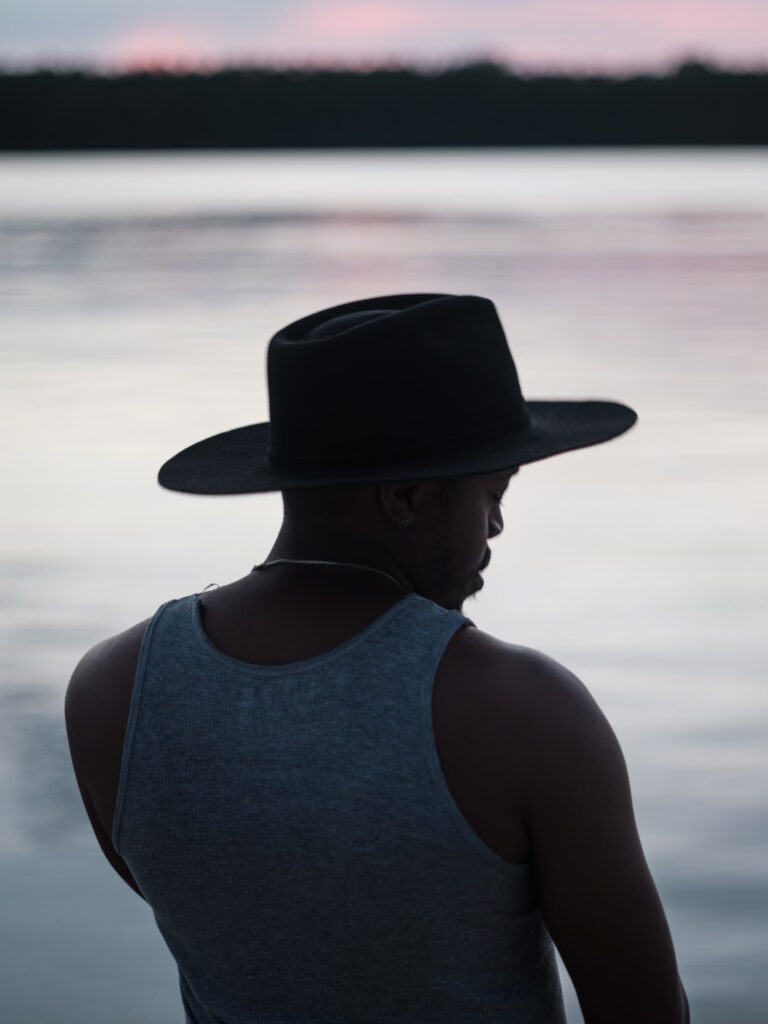
At the end of the album’s final track, “Secrets,” we hear the sounds of the river — the water splashing, birds chirping from a distance. What does that body of water mean to you?
I really appreciate the Mississippi River; it’s more than just a fishing spot to me. It’s a very spiritual entity on this earth. I consider it to be a life source. I thank the river so much for the supplements that it gave to my ancestors because they weren’t probably getting the ample amount of nutrients that they needed while they were working in chattel slavery as enslaved people. That river gave them and supplied them with the extra protein that they needed to survive. I think about those things when I’m out there on the river. I try to thank it every time I’m home. I try to bring all things sweet to it — roses, wine, honey fruits — just as an offering and to thank it for everything.
You mentioned that Hillaryville is no longer a desirable place to live. Do you see a possibility for it to change in the future?
I want, especially the young folks, to be proud of where we’re from. Many of us don’t even know the legacy of the place that we’re from. Right outside of Hillaryville was one of the largest plantations in the country. That was over where those eight slaves enslaved men came from. From there, our ancestors built this town that was a beautiful sustaining place. A lot of the younger generation don’t know this. A lot of this stuff has died off with the elders, the ones who have taught me. I want them to know that we can honestly get back to a place in Hillaryville’s time, progress it to where we are a community that has businesses again, and we’re uplifting each other. In some ways, we are a self-sustaining community where the businesses that are there could hire and employ folks from Hillaryville. The money that’s made into these businesses stays within the community. These are goals, wishes and dreams that I would love to see for Hillaryville in the future.
I feel like it’s especially important right now to talk about this place and other places like this in the rural South because, just like Hillaryville, I’m sure there are many other towns where once we had the sugarcane fields, farmlands, or whatever and these subdivisions are starting to pop up. These people who are moving into these subdivisions honestly have no clue, no context of who they’re taking this land from. Whoever’s listening out there, I hope to tell them that this gentrification that’s happening in cities all over the United States and all over the world is also happening in rural areas.
You’ve mentioned on social media that your favorite place to write songs was from your grandmother’s front porch. Were there any songs on the album that were written there?
“Lord Have Mercy” definitely was written on that porch. The beginnings of “That Feeling” were written on that porch. A lot of the other tunes were written on a piano that I had close by in Bloomington, Indiana. I really believe in safe spaces with writing and creativity. My grandmother’s porch is definitely one of those spots for me. I got mad love for all of my neighbors in Hillaryville who don’t mind me singing till two or three o’clock in the morning while I’m just writing away on the porch (laughs).
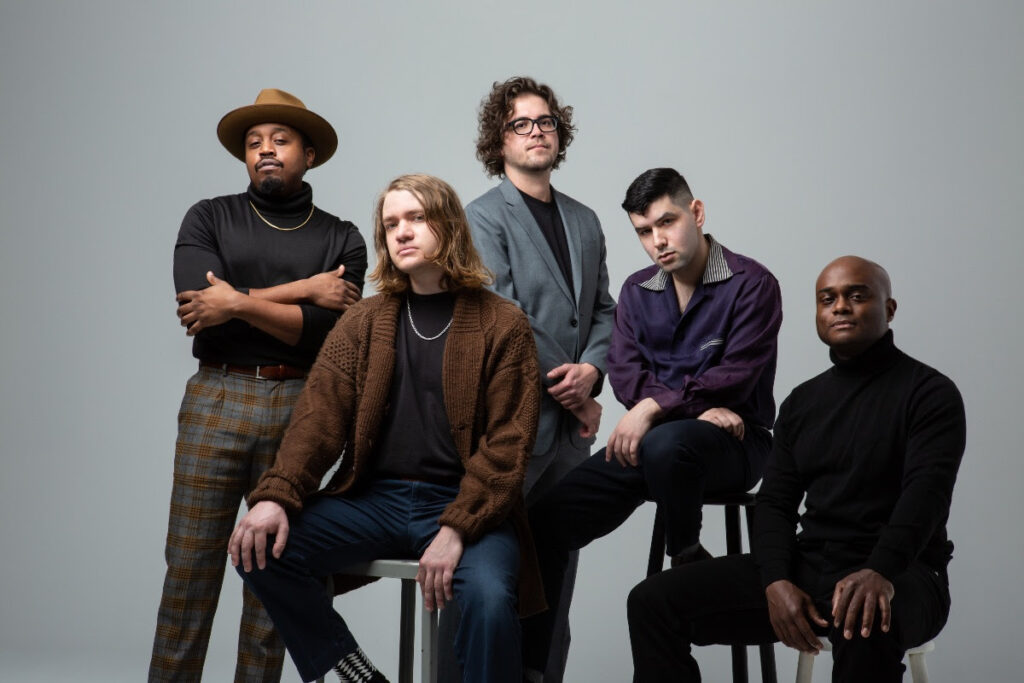
How would you compare the writing and recording process of your debut album with what you typically do with Durand Jones & The Indications?
With The Indications, we’ve definitely found something that works for us. It’s very methodical and precise, which is awesome. It’s a fine, well-tuned machine. With Wait Til I Get Over, I wanted the process to be a little more abstract and weird. I wanted to try things that I’d never tried before. I told myself that everything needed intention and [to] be art forward with my solo project. It was really fun trying all these super abstract and new ways to write. Some of them stuck and some of them didn’t. I can’t wait to apply more of that in my solo stuff in the future as well as with The Indications.
The title track is a highlight of the album. It’s where your gospel roots shine the brightest. What was the inspiration behind it?
It’s loosely based on this style of gospel called hymn lining. It’s something that I used to do a lot in church as a kid. The mother of the church, who would sit at the front, would stand up and do the call, and then everybody else would stand up and do the response. As a kid, I just hated it so much. I didn’t understand it. I thought it was old-fashioned. As an adult, and going back to church with my dad, they don’t do that stuff anymore for those reasons because people are saying it’s old and all that jazz. I started to miss it so much. I thought of it to be a way that the elders were instilling in me traditions that were passed down to them. I started to really see just how special it was. I knew that whenever I was gonna make this album, I had to write a song based in hymn lining to pay homage to the elders.
What was your experience creating and recording “What Til I Get Over”?
I have to thank this incredible songwriter, Krystle Warren. She wrote this record “Move!” [from Three The Hard Way]. She recorded herself in a full choir. After talking with her producer, Ben Kane, I was like, “I’m gonna give this a shot and try it myself.” So, I just set up a mic in my room and pretended to be each person in the choir. I wanted to emulate all of the singers that I grew up with because they’re just as big of an influence on me as Donny Hathaway or Aretha Franklin: Dawn Shivers, Lamarious Jackson, Ms. Vanessa, my stepmom — rest in peace, Penny Jones. I did that recording as a demo. The guys in the studio were like, “No, this is the track. This is it.” I feel like a lot of the record has that theme of the juxtaposition between old and new, which is exactly where Hillaryville is at right now. I’m so happy with the way that “Wait Til I Get Over” came out. I hope my elders are proud of it because it’s for them.
What do you hope people take away from Wait Til I Get Over?
I really would love to just show people the perspective of someone from the rural South, specifically the Black rural South. I wanna show them that we are just as nuanced and complex and all of those things as much as anywhere else. There’s magic. There’s supreme deep magic and beautiful complexity in the rural South. It would be so easy to miss it if you’re not aware. The rural South got something to say, baby!
Stream Durand Jones’ solo debut album, Wait Til I Get Over, below.

